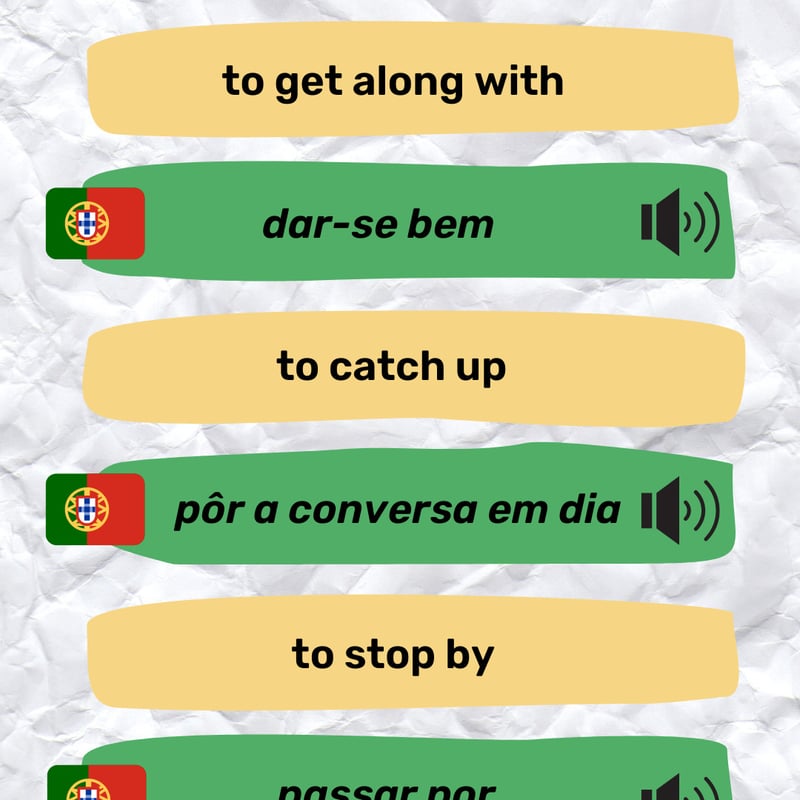Afonso talks about himself and his friend Sónia in this simple introduction.
Sou o Afonso
I Am Afonso
Até que a Tempestade Passe
Until The Storm Passes
As a storm rages in Portugal, Joca is convinced he can brave the elements. Keep an eye and ear out for many different uses of the preposition até.
English Expressions in Portuguese
One challenge of learning Portuguese, or any language, is that you can’t simply translate literally. Each language has its own conventions for how to word different concepts. This is known as idiomatic language. In this Learning Note, we’re focusing mostly on how to translate English “phrasal verbs” into Portuguese. (If you’re looking for other types […]
Choosing Between Portuguese Prepositions
When you start learning about Portuguese prepositions, you’ll quickly realize that the translation is very dependent on context. This makes it tricky for non-native speakers to determine which preposition to use. In this Learning Note, we’ll review some commonly confused prepositions to help clarify these distinctions. Place: When to Use “A” vs “Em” The preposition […]
“With” In Portuguese – How To Use It Correctly
In today’s episode you’ll learn about a very important preposition — “com”, which means “with” in Portuguese. “Com” can be tricky because of how it combines with personal pronouns. For example, you can’t say “com mi” ❌. You have to say “comigo” ✅ – “with me”. Some pronouns take on a new form like this […]
Saudação ao Gato
Cat Salutation
Rival neighbours Marina and José attend a yoga class. For more context, we suggest you first listen to the 3-minute Shorty – À Procura da Gata Perdida. Thanks to one of our members, Sarah, for writing this episode! ❤️
Na Festa da Laura
At Laura's Party
Bianca and Rodolfo meet at a mutual friend’s party. Notice the variety of ways the preposition “de” is used throughout their conversation.
Carolina, A Curiosa
Carolina, The Curious One
Carolina can’t wait to open her Christmas gifts!
Where Are You From?
In this Learning Note we’ll cover 3 main topics: 🗺 Countries in Portuguese (so you can say where you’re from!) 🤓 Whether to use a definite article (o or a) before the name of your country 🗣 How to state which language(s) you speak and your nationality (both male and female forms) You may have […]
Frango da Sarjeta
Gutter Chicken
Explore the preposition “de” in a variety of contexts as Artur and Diana discuss where they should go on vacation.
Licença Para Sair Da Mesa
Permission To Leave The Table
Rodrigo must finish his food before he can leave the table. Language features: personal infinitive the preposition “para”
Relative Pronouns
This unit will cover relative pronouns in Portuguese. Relative pronouns are used to connect a dependent clause to the main clause of a sentence. A dependent clause refers to someone or something mentioned previously. The relative pronoun establishes a relationship with an antecedent and it’s that relation that allows us to understand who or what […]
Por Quem Me Tomas?
Who Do You Take Me For?
Miguel has a short conversation with Bruna before heading to the grocery store. Notice how the preposition “por” is used in a variety of different contexts throughout their dialogue.
How to Talk About Likes and Dislikes in Portuguese
I like… The most important verb to learn when talking about likes and dislikes in Portuguese is . Let’s start with a simple example: It’s important to remember that the preposition goes along with the verb gostar. Adding de may seem strange at first to English speakers because we don’t use a preposition in this context. […]
Querida, Perdi A Carteira
Honey, I Lost My Wallet
Rodrigo lost his wallet again and Márcia is helping him look for it. Throughout the dialogue, notice the different uses of the preposition “em” and how it forms contractions with many other words such as in noutro, nela, no, etc.
Using Prepositions in Portuguese Questions
We’ll cover prepositions in more detail in later units, but for now, let’s go over a few prepositional phrases that come up frequently within Portuguese questions. You’ll notice that the preposition always comes right before the question word: Para Por
The Pronouns Si & Consigo
Grammatically speaking, the pronouns si and consigo belong to the 3rd person subjects: ele(s)/ela(s). This is because they were initially only used as reflexive pronouns*, which are pronouns that refer to the same subject or thing as the verb. For example: The sentence above is still correct and wouldn’t be confusing because the context makes […]
Using Tonic Pronouns with Prepositions
In this Learning Note, we’ll explore each tonic pronoun and see some examples of how it is used along with different prepositions. As you will see, certain prepositions change the form of the pronoun, especially . Summary Before we explain each pronoun in detail, here’s a quick overview. This chart shows each individual tonic pronoun […]
Introduction to Tonic Pronouns
Personal pronouns can be classified according to how they are used within a sentence. There are clitic pronouns (), which are unstressed, and tonic pronouns (), which are stressed. This learning note will serve as an introduction to tonic pronouns in Portuguese, however, let’s first see an overview of all the personal pronouns in order […]
Simple Prepositions and Prepositional Phrases
So far, you’ve learned what prepositions are and you’ve been introduced to quite a few of them. Similar to English, there are dozens of prepositions in Portuguese grammar. There are simple prepositions (single words, some of which form contractions with pronouns and articles) and there are prepositional phrases. For example: Simple preposition (de): Prepositional phrase […]
The Preposition “Com”
One very common Portuguese preposition is Like all prepositions, it’s an invariable word placed before a noun (or pronoun) to indicate the noun’s relationship to other words. When to Use “Com” Just like the English use of “with”, the preposition com is used to… Indicate people or things that are together: Say what something has, […]
Aonde vs Onde
Onde The adverb indicates a location. Examples: Onde can be used to replace expressions such as: Aonde is a contraction between the adverb and the preposition . It’s most commonly used with
Um Convite Amigável
A Friendly Invitation
Diogo is invited by his friend Marco to attend a special event.
O Fato Faz o Homem
The Suit Makes the Man
With the help of a competent sales assistant, a man looks for the right suit to renew his wardrobe.



 Rui
Rui
 Eliana
Eliana Pedro
Pedro


 Joel
Joel
 Natacha
Natacha
 Sandra
Sandra















 Joseph
Joseph